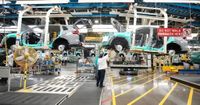Honda Canada has reassured its operations in Canada will continue at full capacity despite media reports suggesting a shift in production to the United States. On April 15, 2025, Honda Canada stated it could not comment on the specifics of the headlines circulating but confirmed that its manufacturing facility in Alliston, Ontario, would remain fully operational for the foreseeable future. This announcement comes in light of a report from the Japanese newspaper Nikkei, which indicated that Honda was considering relocating some vehicle production from Canada and Mexico to the U.S. in response to new U.S. auto tariffs.
In its statement, Honda Canada emphasized, "We constantly study options for future contingency planning and utilize short-term production shift strategies when required, to mitigate negative impacts on our business." This response follows concerns raised by Ontario Premier Doug Ford, who stated he had been informed that the media report about Honda was inaccurate. Ford mentioned he spoke to the president of Honda Canada, who would clarify the situation further.
Industry Minister Anita Anand, who is also campaigning for re-election in the Ontario riding of Oakville East, announced she would meet with Honda Canada’s CEO later that same day to discuss the matter. She expressed that Honda had communicated no production decisions affecting Canadian operations were being made or considered at this time.
The reported plans to shift production have drawn sharp criticism from federal party leaders, who labeled them as an attack on Canada’s auto sector. Liberal Leader Mark Carney highlighted the broader implications of such moves, stating that the Honda news underscores the scale of the attack on the Canadian auto sector as a result of U.S. President Donald Trump’s trade policies. Carney remarked, "We’re seeing some of the impacts in the short term of that with layoffs for some of our automakers, potential shifts in production if this situation remains, huge increase in costs ultimately to American consumers, obviously Canadian consumers."
Conservative Leader Pierre Poilievre echoed these concerns, asserting that Trump deserves condemnation for unfairly targeting Canada. NDP Leader Jagmeet Singh expressed his worries about the potential impact on thousands of jobs in Canada, stating, "This is potentially going to impact thousands of jobs in Canada and have a devastating impact on the automobile sector for the long term."
According to the Nikkei report, Honda is planning to ramp up U.S. vehicle production by as much as 30 percent over the next two to three years, a move prompted by Trump’s imposition of a 25 percent tariff on imported vehicles. The potential shift could significantly affect Honda’s Alliston facility, which employs approximately 4,200 workers and produced around 375,000 vehicles in Canada in 2023.
Meanwhile, President Trump suggested on April 14, 2025, that he might temporarily exempt the auto industry from tariffs to allow car manufacturers time to adjust their supply chains. Trump noted, "I’m looking at something to help some of the car companies with it," implying that automakers would need time to relocate production capabilities back to the U.S.
In a related development, Canadian Finance Minister François-Philippe Champagne announced that auto manufacturers would be permitted to import a limited number of U.S.-assembled vehicles without incurring the retaliatory tariffs imposed by Canada in response to Trump's tariffs. This measure aims to alleviate some of the pressures on the North American automotive industry, which is highly integrated, particularly between Canada and the U.S.
Champagne explained that the number of tariff-free vehicles a company can import would decrease if there were reductions in Canadian production or investment. Prime Minister Carney reiterated that Trump’s tariffs are an attempt to dismantle the integration benefits that have historically characterized the North American auto sector.
Trump’s tariffs, which include a 25 percent levy on all imported automobiles, have raised concerns across the industry. The duties on auto part imports to the U.S. are expected to take effect by May 3, 2025. The Liberal leader stated he has been in contact with various automaker CEOs to discuss the implications of these tariffs and the need for a coordinated response.
The auto sector has been a focal point of tension in U.S.-Canada relations, with vehicles often crossing the border multiple times during production. Experts warn that these tariffs could lead to increased prices for consumers on both sides of the border. The integration of the Canadian and American auto industries dates back to the 1965 Auto Pact and was further solidified with the North American Free Trade Agreement, which was replaced by the Canada-United States-Mexico Agreement (CUSMA) during Trump’s presidency.
As the situation unfolds, the Canadian government is also preparing to offer a temporary six-month tariff holiday for goods imported from the U.S. that are essential for Canadian manufacturing, processing, and public health. This initiative aims to help Canadian businesses adjust their supply chains amid ongoing trade disputes.
Recent polling indicates that Canadians are increasingly concerned about the economic ramifications of the tariffs, with a Leger poll revealing that 78 percent of Canadian respondents worry about stock market volatility linked to U.S. tariffs. Furthermore, 87 percent of Canadians believe the new tariffs will adversely affect their personal finances, a sentiment echoed by a smaller majority (78 percent) of American respondents.
The ongoing trade tensions and the potential shifts in production from Canada to the U.S. have left many in the Canadian auto sector on edge, as they await further statements from Honda and the U.S. administration regarding future tariff policies and production strategies.





